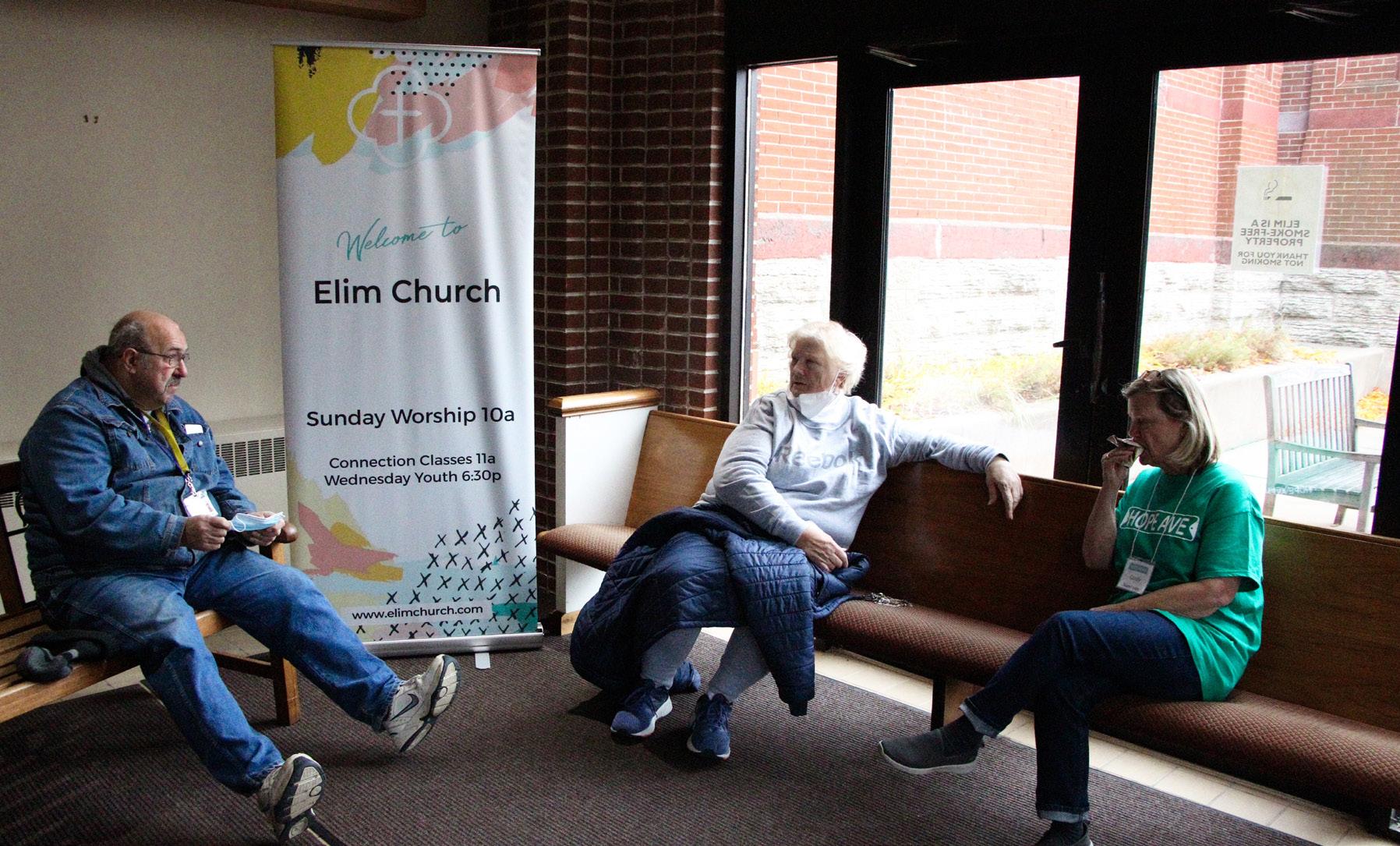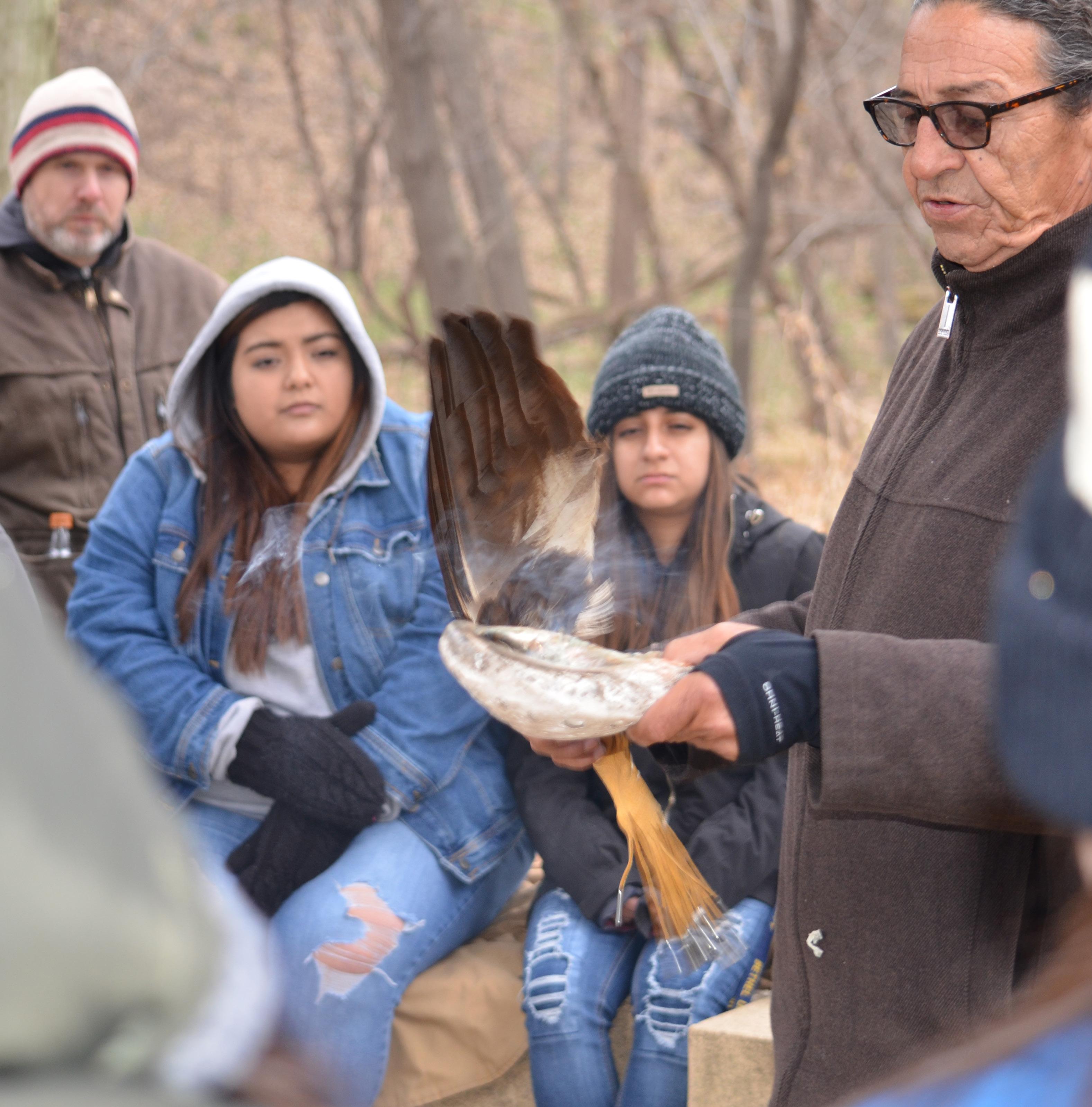
12 minute read
Precious life and incredible flight
Seeing the invisible
Northeast Minneapolis pastor serves her community by providing meals and shelter for homeless people in the area.
Advertisement
By Molly Wilson
Pastor Becky Hanson walked into the red brick church at 1229 Logan Avenue in 2019 and started crying.
She turned to her fellow
Hope Avenue board members: Pastor Paul Olsen, Rev.
Kim Stephens and Heather
Carlson. Here’s how she best remembers the rest of that conversation and that day:
“This is it,” she said.
Stephens felt it, too. This building is where the new shelter for Hope Avenue would be, the next step to growing the homeless ministry, which had been working exclusively out of Elim
Church in Northeast Minneapolis until this point.
Then Carlson saw the dead rat.
“The bathrooms were really gross and I was worried it was not up to code,” Carlson said.
But the building sits in the middle of all the issues Hope Avenue wants to confront by creating a shelter. Sometimes gang shootouts happen the next street over and the people involved run through the property.
The team considers it, but ultimately it is just too expensive to repair all the damage and get the building up to code. They look at other, cheaper properties, but none of them are the same. None of them are 1229 Logan
Ave.
Hanson knew God was calling her to build a shelter, but it had to go on hold for a while so she could care for the existing ministry at Elim Church. There she gets to create a place full of God’s love and belonging every Saturday when they come to Elim for a free hot meal of breakfast burritos and coffee. She asks everyone before they leave if they got a new set of clothes and a bagged lunch. In the winter the big question is “Do you have gloves, a jacket, and boots?” She never lets them leave until all the essentials are taken care of.
“We joke about ourselves being as ‘Cheers’ – an old TV show about people having a place where everyone knew their name,” Hanson said. When the Minnesota winters get particularly bad she opens a shelter in the church gym. Her team sets up cots and a long table for all the treats church members bring in. No apples or carrots though, she learned that early on when a woman named Lynelle Nerison looked at her and said, “Pastor Becky, we don’t have teeth.” This is a story about learning just because a problem seems invisible doesn’t mean it’s gone. It’s about accidentally inspiring a congregation to start a non-profit and about Becky Hanson valuing her mother over the family secret. It is about a round of applause from men she would have been scared of in 2006, not listening to her pastor when he was wrong and helping someone change the locks.
Hanson has been teaching her three children about homeless people since they were little. She would carry tube socks and food in her minivan, and whenever the family would come across a homeless person they would pull over and one of the children would hand them the gift.
In 2006, Hanson set out to give a sermon on how homelessness was not an issue within a mile of Elim Church sat. She took her son’s friend, Erick Skoglund, who was a senior at St. John University, with her to shoot a video proving that there were homeless people in Northeast Minneapolis. Hanson and Skoglund walked to Saint Anthony Boulevard and found a row of 25-foot evergreen trees with people sleeping underneath the canopies which were the length of a couch.
“Nothing about that day proved me right. I saw homelessness upfront. People were in desperate need, cold as it was already November, hungry,” Hanson said. “They weren’t addicted, just people. It rattled how I saw the needy and tore down my presuppositions.”
Then they walked The Hill on the corner of Washington and Dowling Ave N where she encountered a man named Steve Eggersglus. He showed them his tent hidden behind a printing company. The company didn’t know he was there.
“Steve and everyone else wanted to talk to us. They saw themselves as invisible,” Hanson said.
Skogland compiled a six-minute video of interviews with these people.
“I just look at this every day and I wonder ‘do they even care?’” A man in sweatshirt, jacket and bright blue New York hat asks. “Are they trying to care? Do they want to care?”
The same man starts crying and says, “I’m from Memphis, Tennessee. I came here with a construction company. They went non-union and let go of all the people. I’ve been stuck here ever since.”
The entire time Hanson has a comforting hand on his shoulder.
“God’s here. He gave me sunshine today. I was thanking him earlier for the beautiful warmth today,” a woman sitting in the grass on cardboard and newspaper said. “The sun is good. It feels wonderful and I thanked him for it twice today.”
She explained that she usually stays in a church shelter at night and gets a meal there. If she couldn’t, she would sleep under the cardboard she’s sitting on.
When the congregation at Elim Church saw it, they wanted to do something.
“It made me uncomfortable,” Leadership Team Chair Brian Turnquist said.
In her sermon, Hanson mentioned some of the common misconceptions and thoughts people, including herself, have when they see homeless people.
I don’t want to get involved.
It’s too much of a commitment.
I would like to help this person, but I think if I give them money they are just going to buy alcohol with it.
Hanson wasn’t setting out to make a minis-

After serving homeless people for two hours one Saturday Hanson sits with her team to talk through and changes that need to be made, the progress on the new shelter and how to help with some of the issues people who came have been facing. | Photo by Molly Wilson.
2006
2007
2007-08
2011
2017
2018
2018
2019
2019
Feb 2020 - May 2020
2021
2021 Hanson and Elim Church starts Hope Ave after she gives as sermon about the issue of homelessness in Northeast Minneapolis. They go out and give away breakfasts on Sunday Mornings. Starts a Bible study and starts serving breakfast.
35 Baptisms
Two men from gangs are baptized
Pastor Paul Olson becomes lead pastor at Elim Church
Create a shelter team to start shelters during extreme cold
Hanson’s son moves to Washington DC and his house becomes a transitional home called Hope Homes
250 people coming to breakfast weekly
Hope Ave is moved from the 3rd floor to the basement and people stop coming
Open a temporary shelter during the beginning of the COVID 19 pandemic with the church next door Strong Towers Parish
Hope Ave is moved to Saturdays
Hope Ave Twin Cities opens a shelter at 1229 Logan Ave.
try she just wanted to highlight an issue she and her family were vaguely aware of. That week in their staff meeting the pastors talked about the issue and how their congregation wanted to help.
A fellow pastor Joyce Poley looked at Hanson and said, “You preached it, you deal with it.”
So, Hanson scheduled a meeting for the congregation to come together and talk more about the issue and what they could do about it. And so they started going out into the community to help by providing food at The Hill.
“I was the very best Jonah you could imagine,” Hanson said, referring to the Bible character.
When Hanson was growing up in Mankato during the 1960s, her family’s setup was typical for the time and it worked. Her dad went to work at Minnesota State University, Mankato every day to teach Physics and Electrical Engineering. Her mom stayed home to clean and raise their seven kids.
“The house was always immaculate and homemade supper was served promptly at 5:30 p.m.,” Hanson said. “I don’t know that she enjoyed it. It was what ‘women did’ in the 1940s-60s. She found purpose in caring for her family.”
Hanson remembers sitting at the table with her mom. She would drink a Tab while her mom enjoyed a cup of coffee. They always liked going to visit Hanson’s grandpa, but when he died her mom started drinking. Hanson was in ninth grade. Because of the drinking and the Charcot-Marie-Tooth disease her mother was facing, Hanson started taking over her duties: raising her younger brothers and cleaning.
CMT is a disease that causes nerve endings to die in the feet, the fingers, the nose and other parts of the body. The neighbors knew why Hanson’s mother had to be in a wheelchair, but they didn’t know about the alcoholism. It was the family secret. No one outside of the family could know.
It was an unspoken rule, but when, at 17 years old, Hanson came home to find her mom on the floor in the bathroom after hitting her head, she knew had to do something to help with the disease her mother was struggling with. She drove her mother over to a rehab facility so she could detox.
In the process, she exposed their family secret her parents had spent so much time hiding. When her dad got home and found out about what Hanson did, he was furious. He told her she had to leave home and went to get her mother from detox.
Hanson moved in with some of the girls who had graduated high school the year before and had an apartment.
“I have greater compassion for those with addiction issues, and I’m not shocked by people ‘falling off the wagon.’ But I am also aware that there is a way out, and that is Jesus,” Hanson said. “My divorce was a greater influence. Hope Avenue was birthed the winter after my divorce. I ‘saw’ people who hurt. I drew near them out of their need…but mine too.”
In 2019, when Hanson founded the Hope Avenue shelter, she knew that the environment was going to be Christian and safe. That meant no drugs, sexual advances or stealing. The shelter would always be a place where homeless people could have the best night’s sleep because they are not worried about any

- Heather Carlson, former member of the shelter board
of these problems shelters usually have.
If somebody broke the rules, Hanson asked them to leave. No questions asked.
In 2020, when that shelter lasted for three months instead of a few days, she knew she needed some help. Hanson hired Monica Nielson to run the shelter. Nielsen didn’t have the same values as Hanson.
Her main focus was getting people in. She didn’t care about the drug exchanges in the bathrooms and the rumors of sexual abuse. She didn’t care that no one could sleep well for fear of their belongings being stolen.
Heather Carlson knew this had to stop. She approached Hanson and they fired Nielson. They left to go tell the people staying in the gym. When they did, the men and women stood up and started clapping. Hanson hadn’t met many of them yet. They were glad to have the safe shelter they always requested back. A place where they cannot be tempted by drugs, abused or stolen from.
Those dealing drugs, abusing and stealing either stopped or left. Sometimes of their own accord. Sometimes because Hanson told them to leave.
When Hanson told her pastor at age 26 that God had called her to ministry, he told her that, because she’s a woman, her idea of entering ministry either came out of not truly being saved or worse, she was listening to Satan.
She did not let that stop her.
“I always knew the day would come that I would go to seminary,” Hanson said.
In 1998, at age 48, Hanson started at Bethel Seminary in St. Paul to get her Master’s of Divinity with an emphasis in Pastoral Ministry. While there, Hanson took a class about the women in the Bible taught by Linnea Winquist.
“By the time that class was over I just felt like I had been lied to for years – told that women couldn’t do, women couldn’t be, women couldn’t follow God in this way. It was just earth-shattering,” Hanson said.
Junail Freeman Anderson stands outside Elim Church in November 2021 at the table where breakfast is served. Hanson is beside her as they take a look at the locks that came from Hanson’s son’s old house that was being used as a halfway home until recently. Freeman Anderson’s mom has been locked out of her house by her daughter-in-law. Hanson is offering new locks.
When they realize none of the locks they have are deadbolts, she and Hanson make a plan: Monday, they are headed to Home Depot. Hope Avenue will pay for it. All Freeman Anderson needs to do is send a picture of the current locks so they can get the right kind and find someone to install them.
“It is not the skill set God gave me, but if you need to lead someone to Christ bring them my way,” Hanson said
In a 2021 meeting with the Board of Hope Avenue, Hanson felt God calling her to follow a lead for a church that wanted to open a shelter. She called the church and the lead pastor, Jesse Williams, picked up the phone. He says he never usually does but God was telling him: This one is important.
Thirty minutes later the team was at the property. 1229 Logan Ave.
“She is someone who was called by God and is listening,” Carlson said. “God told her she was going to do [the shelter] and it was ‘get out of the way or join it.’”
Through disease, sexism and bad advice God has always provided a path for Hanson to follow His calling.
Designed by Joy Sporleder

Participating with others to build the Beloved Community that Dr. King dreamed about. The mission of the Bethel FSU Partnership is to build and nurture an intentional, mutually beneficial, long-term relationship with stakeholders in the FSU neighborhoods and Bethel University.





